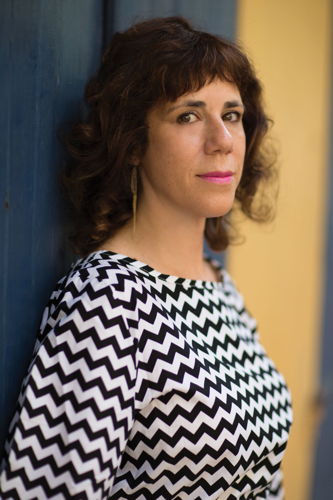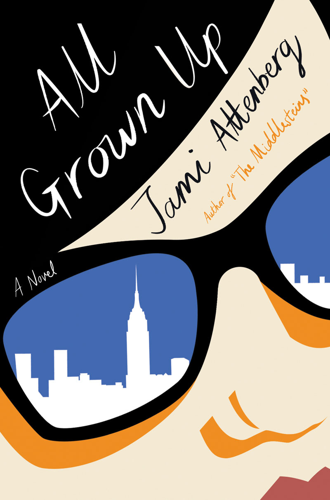
There are writers who use social media solely for self-promotion, and others who use it for networking and a sense of community. Then there are those like Jami Attenberg, who shares pieces of her life daily with her thousands of followers — to the extent that it’s hard to not feel like you know her better than you actually do. She talks honestly about the ups and downs of writing and editing novels, but she also shares furniture-buying decisions and Mardi Gras selfies. And then, of course, there’s Sid, her adorably Instagrammable dog. The overall effect is nothing remotely narcissistic, but rather endearing — you find yourself rooting for her successes, and you can’t wait to finally read her next book.
That book, All Grown Up, is a novel about a single, childless woman on the verge of turning 40 in New York with a life she’s no longer sure she still wants. It’s not that Andrea wants a husband and children — she definitively doesn’t — but she feels stuck in her job and unable to emotionally process that her niece is dying and her brother and sister-in-law are flailing trying to care for a chronically ill child. Andrea doesn’t regret dropping out of art school all those years ago — not exactly — but she wonders if phoning it in at her advertising job and continuing to date the wrong men is still the best use of her time. What does it mean to be an adult, Attenberg asks, if you have none of the traditional trappings that signify adulthood — no spouse, no kids, no property, no ambition, no emotional maturity?
As someone who has just turned 40 myself, still unmarried, I found that parts of All Grown Up felt all too real. But to imply that you need to be single or female to appreciate All Grown Up would be a severe disservice to Attenberg, who in her most recent novels, The Middlesteins and Saint Mazie, excels at creating complicated and multifaceted characters who are all too human. The Scene caught up with Attenberg as she was somewhere in the middle of what seemed like, per social media, an exhilarating and exhausting book tour.
I know that nothing about All Grown Up is autobiographical, other than that you, like Andrea, used to live in NYC and are in your 40s and happily unmarried and childless, but I’m curious as to the response you’ve been getting from readers or interviewers out on tour. Are people assuming that Andrea is a thinly veiled version of you? I just wrote an essay for The New York Times about this very thing. But I think that it’s been really split, which is interesting. Because some people know how I feel and they don’t ask about it, but the other half do. Anyway, I feel like I can’t even think about it anymore, because I just wrote all about it, if that makes sense.
Photo by Zack SmithIt does. You had tweeted this morning about likability, and someone responded referencing the whole debate around likable female characters when Claire Messud’s The Women Upstairs came out. I was reminded of that book when reading parts of yours, insofar as the themes of what it means to be an artist and what it means to be female and an artist and to be a female artist. How often are those things you find yourself dealing with in your own life? I don’t know how much I think the book is about being a female artist, per se. It’s funny how people keep assuming I’m Andrea, when really the character I most identify with is Matthew, the struggling artist [whom Andrea dates]. I like to think that being an artist transcends age and transcends gender — but I don’t want to say it transcends race, because I can’t say that as a white person. But in my daily life I definitely think about being a female artist. I wish I didn’t have to, but it’s impossible to escape.
Do you think we’ll ever get past that? Past where women are criticized when they do not write “likable” characters, when that same criticism doesn’t typically apply to the characters of male authors? I don’t know! I’m going to be the most generous I can be here, and say that some people read books for very different reasons, and some people read books for likable characters. And that’s OK! There’s nothing wrong with that. But that’s not what I’m interested in writing. Just like sometimes we like ourselves and sometimes we don’t like ourselves — just like sometimes we don’t like our friends, even when we love them. I wanted to be emotionally true when creating a character. I’m not interested in writing a character that’s not 100 percent human.
A couple of reviews have seemed to take issue with Andrea’s “narcissism,” but you’ve had self-absorbed women in your previous books, like in The Middlesteins. Do you think that reaction has anything to do with Andrea being so unapologetically uninterested in being a wife and mother? The way I wrote The Middlesteins and Saint Mazie, you get to jump between different characters — with Mazie there’s a multitude of voices. But All Grown Up is just offering up a single gaze, so you’ve got to be all-in on Andrea’s gaze and want to spend time on her. But certainly, probably a certain female voice — I mean, I don’t want to get into politics, but it is absolutely sexist to impose the likability factor on a female voice.
Does it get to you the way the literary press still spends so much time fawning over male novelists? Like, it’s definitely improved since the 1990s, but you still have articles like that New Republic piece this week about the future of fiction or whatever, with not a single female author included. I mean, what were they thinking? I don’t know, you tell me! Because women sell a lot of books, and women read a lot of books. Far more books than men. But I don’t know if I’m really allowed to complain in a way, because I’ve gotten tons of attention the past few years, and with this book especially. Which has been great. But it’s still a problem, and I think you can see that with the presidency. Should we send him some books, by the way? But it feels like the state of the union right [now] is this last grab for attention by white men, because they know their time in power can’t last.
Near the beginning of All Grown Up, Andrea says: “A book is published. It’s a book about being single, written by an extremely attractive woman who is now married, and it is a critical yet wistful remembrance of her uncoupled days. I have no interest in reading this book. I am already single. I have been single a long time. There is nothing this book can teach me about being single that I don’t already know. Regardless, everyone I know tells me about this book.” And I’m pretty sure I know what book this was, because the same thing happened to me when it came out. However, reading your book kind of made me want to do the same thing — to send copies to all my single friends. One of the first things my editor said to me when I turned in my first draft is that it would turn into a book like that. But would Andrea approve of people sending it to their single friends? I don’t know if she really would. I think she’d be like, “I can find my own book, thanks.”
OK, last question — will Sid be at the reading? Oof, I don’t know. The last time I took him to Parnassus, he was terribly behaved, and I was so embarrassed. He doesn’t like applause — it might be too much for him.






